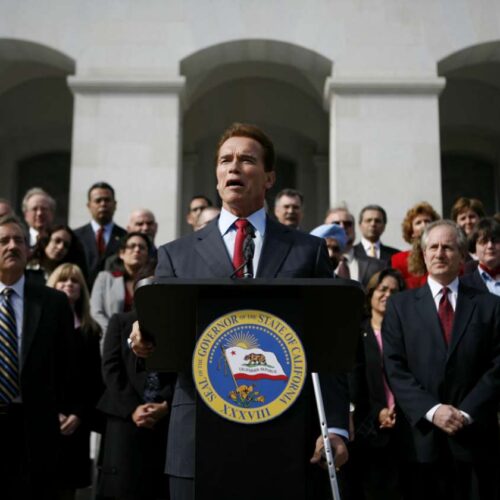Introduction
Unlike former California Governor Arnold Schwarzenegger, a Republican, Democrats in Congress decided as they worked on health care reform that providing coverage to the estimated 11.5 million undocumented residents in the U.S. would not be a good idea.
Actually, it would be more accurate to say that many of them were unwilling to vote for a reform bill enabling undocumented residents to buy coverage on the state health insurance exchanges out of fear that doing so might jeopardize their re-election chances. The bill that became Obamacare contains language singling out the undocumented as ineligible.
Schwarzenegger wasn’t as worried about his political future when he proposed a plan in January 2007 that was similar to the one enacted in Massachusetts under then-Governor Mitt Romney. Schwarzenegger’s plan had one notable difference: it would have required every Californian — including all of the state’s 2.6 million undocumented residents — to have health insurance (The Massachusetts law does allow the undocumented to receive state-funded care through the Health Safety Net program for low-income persons). Schwarzenegger was feeling pretty secure politically at the time. Just two months earlier he had been re-elected in a landslide, winning 56 percent of the vote to Democrat Phil Angelides’ 38.9 percent.
Schwarzenegger’s reasoning was that undocumented immigrants who went to hospital emergency rooms for care but couldn’t pay their bills were taking advantage of the state’s taxpayers.
“In California, the cost of emergency room care for undocumented immigrants is nearly a billion dollars a year,” Schwarzenegger’s Health and Human Services Secretary, Kim Belshe, told PBS NewsHour’s Gwen Ifill back then. “We are required under federal law — hospitals are required, I should say — under federal law to provide services through emergency rooms, which is appropriate and humane. But emergency rooms are the least appropriate, most costly setting. And that is a huge tax burden that California taxpayers are experiencing.”
Like Romney’s reform plan — and Obamacare — Schwarzenegger’s proposal was based on the largely Republican concept of “shared responsibility.”
“This is not a proposal that looks only to government to fix the problem, only to employers, only to any one sector,” Belshe told Ifill. “It is shared responsibility, beginning with the individual, but supported by government, by employers, by health plans and health providers.”
Schwarzenegger’s $12 billion reform plan had bipartisan support, as did Romney’s, but not quite enough, thanks to an unholy alliance between big insurance companies and employer groups and liberal activists and lawmakers who wouldn’t settle for less than a single-payer bill. Insurers didn’t like the bill because it would have required them to spend at least 85 percent of their policyholders’ premiums on medical care. Single payer advocates were upset with Schwarzenegger for vetoing a bill the year before that would have made California the first state to establish a single-payer system. They reasoned that their chances would be better in the future if Schwarzenegger’s proposal went nowhere. A year after the governor unveiled his blueprint, it died in a Senate committee. Lawmakers did pass another single-payer bill in 2008, but Schwarzenegger vetoed that measure too.
Fast-forward six years, and the state’s lawmakers are once again considering expanding coverage to the undocumented. And, according to a poll released last week, a majority of Californians want it to happen.
The poll, commissioned by The California Endowment, a private health foundation that supports community-based organizations — and the Center for Public Integrity as well — found that 54 percent of voters favor allowing undocumented residents to either enroll in the state’s Medicaid program or buy private insurance.
State Rep. Ricardo Lara, D-Long Beach, said he plans to introduce a bill during the next legislative session that would give low-income undocumented California residents access to Medi-Cal, the state’s Medicaid program, and create a dedicated insurance exchange for others who earn more than 138 percent of the federal poverty level. A similar bill was put on hold by a state Senate committee earlier this year because sponsors hadn’t included a plan to pay for the coverage expansion. Lara says a financing plan is now being developed.
Almost a quarter of the nation’s undocumented residents call California home, and many of the state’s businesses depend on them. The Pew Hispanic Center estimates that about one in ten workers in the state is undocumented. Many of them are construction workers and farm laborers. And they pay taxes. The California Immigrant Policy Center recently estimated that these folks pay $2.7 billion in state and local taxes and contribute $302 billion to the state economy annually.
Among the many businesses and organizations supporting Lara’s bill is Health Access California, a statewide health care consumer advocacy coalition.
“Immigrants are central to California’s economy and our communities, and they need to be fully included in our health system, too,” Health Access executive director Anthony Wright told me. “This (expanding coverage to include undocumented residents) is a way to invest in prevention and primary care, improve our health system and lower costs in the long term for everybody.”
He added: “It’s harder to steer a boat with folks hanging off the sides of the ship.”
Read more in Health
Wendell Potter commentary
Comparison shopping for a health plan
California leads the way in providing useful data; nonprofits often rank highest
Health
A call for more scrutiny of private Medicare Advantage plans
Senior HHS researcher says tighter audit standards, other changes may be needed to address aggressive billing practices


Join the conversation
Show Comments